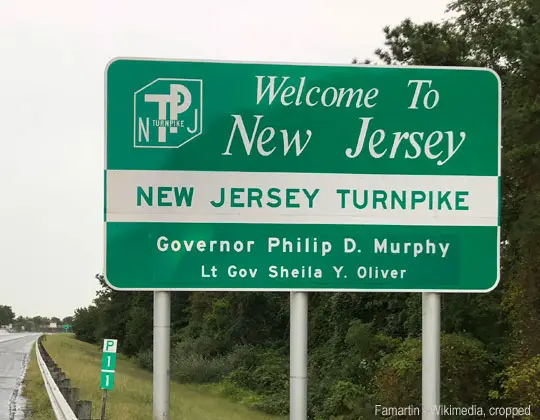1. New Jersey

Already infamous for its high property taxes, New Jersey homeowners could face even steeper rates in 2025 due to increasing municipal budget shortfalls. Experts note that rising infrastructure costs and education funding gaps are the primary culprits. According to NJ Spotlight News, state officials are considering adjustments to tax structures, leaving homeowners bracing for impact. Some municipalities are also reevaluating tax assessments, potentially leading to even higher bills for residents.
The state’s dense population and aging infrastructure further exacerbate the issue, as more funds are required to maintain roads, bridges, and public services. Critics argue that without meaningful reform, New Jersey’s affordability crisis will worsen, driving more residents out of the state. In addition to property taxes, discussions are brewing over possible increases in sales and income taxes to help offset municipal deficits. These challenges underscore the complexity of balancing public funding needs with taxpayer concerns.
2. Illinois

Illinois residents may see substantial hikes as the state struggles to address pension liabilities and infrastructure needs. Local governments are expected to rely heavily on property taxes to bridge funding gaps. The Chicago Tribune highlights concerns among homeowners about affordability and fears of widespread displacement. Illinois has long faced financial difficulties, and its $139 billion pension shortfall remains a looming burden on taxpayers.
Chicago, in particular, is grappling with funding challenges that could lead to property tax increases in the city and surrounding suburbs. Residents in rural areas are not immune, as declining populations leave smaller tax bases to support local budgets. Many homeowners worry these increases could further destabilize the housing market, deterring new buyers. While state officials explore other revenue-generating options, property taxes remain a go-to solution for plugging financial gaps.
3. Texas

Despite no state income tax, Texas is seeing rising property tax rates due to soaring property valuations and increased demand for public services. Rapid population growth in cities like Austin and Dallas is also contributing to this trend. Texas Monthly reports that the state is exploring reforms to ease the burden, but relief is not guaranteed. These efforts include caps on annual tax revenue growth for municipalities, but critics argue they may not go far enough.
Additionally, homeowners are expressing frustration with appraisal processes that frequently overestimate property values, leading to higher taxes. School districts, a major recipient of property tax revenue, are also advocating for increases to address growing student populations. For retirees and lower-income families, these rising costs present significant challenges, prompting some to reconsider their long-term residency. The situation underscores the complexity of maintaining growth while managing affordability.
4. New York

High-cost areas such as Westchester and Long Island are expected to experience property tax spikes tied to budget deficits and education funding. Proposed increases could further strain homeowners already dealing with high living costs. According to The New York Times, residents are voicing concerns over the cumulative tax burden and the risk of being priced out of their neighborhoods.
The state’s school funding system, which heavily relies on local taxes, often leaves affluent areas facing steep increases. Meanwhile, urban centers like New York City are also wrestling with budget constraints that could lead to higher property taxes for landlords, potentially affecting renters. Advocacy groups are calling for statewide reforms to create a more equitable taxation system, but progress has been slow. For now, homeowners brace themselves for another year of financial challenges.
5. Connecticut

Connecticut’s aging infrastructure and pension obligations are driving discussions around increased property taxes. Homeowners in affluent areas like Fairfield County are particularly vulnerable to substantial rate hikes. CT Mirror suggests these changes could impact housing affordability statewide, with ripple effects across the local economy. The state government is also exploring broader tax reforms, but significant progress remains elusive.
Suburban communities are raising concerns about the sustainability of current tax rates, especially as they compete to attract new residents. Meanwhile, urban areas like Hartford are considering targeted tax increases to address funding shortfalls. For many residents, these hikes feel like a double-edged sword, as they fund critical public services but also strain household budgets. The debate continues over how to balance fiscal responsibility with economic growth.
6. California

With property values continuing to rise, California faces mounting pressure to reform Proposition 13, which limits property tax increases. New legislative proposals could lead to higher rates for some homeowners, particularly in high-demand regions like Silicon Valley. Los Angeles Times notes the potential impact on both residents and the housing market, sparking debate over the future of affordable homeownership.
Critics of Proposition 13 argue that it disproportionately benefits older homeowners while placing a heavier tax burden on newer buyers. Meanwhile, cities like Los Angeles and San Francisco are grappling with budget deficits that make property tax increases seem inevitable. Public infrastructure projects, such as transportation and housing, are also driving the push for additional revenue. As the state navigates these challenges, residents face uncertainty over how reforms might reshape their financial landscapes.
7. Pennsylvania

Local school districts in Pennsylvania are pushing for property tax increases to address educational funding disparities. This trend is expected to disproportionately affect middle-class homeowners. The Philadelphia Inquirer warns that the changes could accelerate suburban sprawl as families seek affordable alternatives. With Pennsylvania’s school funding system heavily reliant on property taxes, many districts face tough decisions about balancing budgets without overburdening residents.
Rural areas, often struggling with declining populations, are particularly vulnerable to revenue shortfalls. Meanwhile, urban centers like Philadelphia are grappling with rising costs for public services, prompting calls for tax hikes. Advocacy groups argue for a shift to statewide solutions, such as income or sales tax increases, to reduce the burden on property owners. However, legislative gridlock has slowed progress, leaving homeowners bracing for another challenging year.
8. Florida

While Florida has traditionally benefited from low property taxes, escalating costs for hurricane recovery and infrastructure upgrades are putting upward pressure on rates. Rapid population growth exacerbates the issue, particularly in coastal counties. The Miami Herald reports that these increases could catch many new residents off guard.
The state’s vulnerability to climate-related disasters drives much of this financial strain, as municipalities scramble to fund repairs and mitigation efforts. In areas like Miami-Dade and Broward counties, rising valuations are compounding the problem, leading to higher tax bills even without rate increases. For retirees and fixed-income residents, these changes could significantly impact their cost of living. While state officials explore relief measures, including expanding homestead exemptions, the outlook remains uncertain.
9. Massachusetts

Boston’s booming housing market is driving discussions around property tax reforms to fund public projects and schools. Suburban areas are also experiencing valuation increases, leading to higher tax bills for residents. The Boston Globe highlights concerns about the long-term affordability of living in the state.
With a growing economy and rising property values, municipalities are under pressure to meet increased demand for public services. This includes investments in transportation, affordable housing, and education. Residents in historically lower-tax suburbs are now facing significant rate hikes as their communities grow. Critics warn that without careful planning, these changes could exacerbate income inequality and housing insecurity. Meanwhile, legislative efforts to cap annual tax increases face resistance from local governments reliant on this revenue stream.
10. Nevada

Nevada homeowners could see rate increases as municipalities respond to population growth and infrastructure demands. Las Vegas and Reno are among the cities most likely to experience significant tax changes. The Las Vegas Review-Journal suggests these hikes could deter potential homebuyers in the region.
Nevada’s reliance on tourism revenue has historically kept property taxes low, but recent economic shifts have forced local governments to reconsider their funding strategies. Rapid development in urban areas has also strained infrastructure, requiring substantial investment in roads, schools, and utilities. As a result, many residents worry about the affordability of remaining in high-growth areas. Efforts to reform tax policies are underway, but achieving a balance between revenue needs and taxpayer fairness remains a challenge.
11. Washington

Washington State is considering property tax increases to fund affordable housing initiatives and infrastructure improvements. Seattle’s high property values mean that even modest rate hikes could lead to substantial increases in tax bills. The Seattle Times reports that local governments are under pressure to address rising public needs while managing taxpayer backlash.
The state’s booming tech industry has driven up home prices, particularly in the Puget Sound region, where the demand for affordable housing has reached critical levels. Residents in less affluent areas are also feeling the pinch as municipalities look to equalize funding across districts. Proposed legislation aims to introduce progressive tax measures, but critics warn these could disproportionately affect middle-class homeowners. The debate underscores the tension between economic growth and equitable taxation.
12. Oregon

Oregon’s unique property tax laws, which cap annual increases, are under scrutiny as local governments face revenue shortfalls. Proposed legislative changes could lead to higher rates in urban areas like Portland. OregonLive highlights debates around balancing funding needs with taxpayer concerns.
The state’s reliance on Measure 5 and Measure 50, which limit tax growth, has created disparities in funding for schools and public services. Critics argue that these caps have outlived their usefulness, particularly in rapidly growing areas. Urban centers are calling for reforms to address rising housing costs and infrastructure needs, while rural communities worry about being left behind. As lawmakers weigh their options, homeowners face uncertainty about how changes might impact their financial stability.
